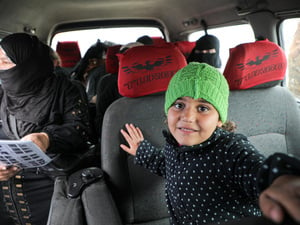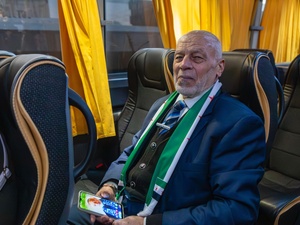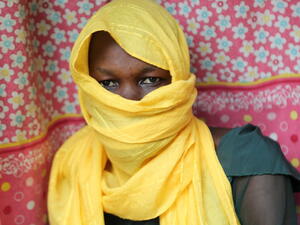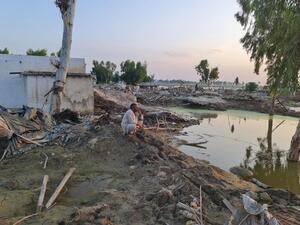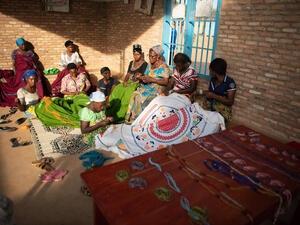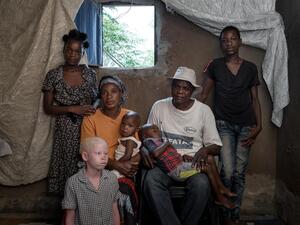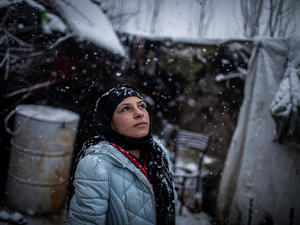UN and partners seek US$8.4 billion for new Syria programme in 2015
UN and partners seek US$8.4 billion for new Syria programme in 2015

Syrian refugees at an informal settlement in Lebanon carry aid items, including wood to strengthen their shelters for winter.
BERLIN, Germany, December 18 (UNHCR) - As Syria's war heads towards a fifth year, the United Nations and partners today launched a major new humanitarian and development appeal, requesting more than US$8.4 billion to help nearly 18 million people in Syria and across the region in 2015.
The appeal includes two main elements: support for more than 12 million displaced and conflict-affected people inside Syria, and addressing the needs of the millions of Syrian refugees in the region and the countries and communities hosting them.
Presented to donors at a meeting in Berlin, the 2015 appeal incorporates, for the first time, significant development aspects in addition to the life-saving humanitarian needs of the largest number of displaced people in the world.
The Syria Strategic Response Plan 2015 addresses acute humanitarian needs inside Syria, aiming to provide 12.2 million people with protection, life-saving assistance and livelihoods support. It requires US$2.9 billion in funding and brings together humanitarian organizations working in Syria and in neighbouring countries.
"Conflict has devastated millions of Syrians' lives, trapping them in conflict areas and denying them access to basic provisions and health care. Many live in fear, children can't go to school and parents can't go out to work," said Valerie Amos, UN Under-Secretary-General for Humanitarian Affairs and Emergency Relief Coordinator.
"This plan, if fully funded, can help us provide food and medicine for children, shelter families from the cold and support those who are desperate and traumatized. Syria is a very difficult and dangerous place to work, but the humanitarian community remains committed to helping the most vulnerable people caught in this crisis," she added.
The Regional Refugee and Resilience Plan represents a strategic shift in the approach to delivering aid for the region. It brings together emergency humanitarian operations and host community support with longer-term programmes aimed at boosting resilience. Requiring US$5.5 billion in funding to directly support almost 6 million people, it is based on planning projections of up to 4.27 million refugees in countries neighbouring Syria by the end of 2015 (representing a slight decline in the rate of outflow from Syria seen this year) and help to over a million vulnerable people in host communities.
"Syria's war is still escalating and the humanitarian situation is becoming protracted. Refugees and internally displaced people have exhausted their savings and resources, and host countries are at breaking point," said UN High Commissioner for Refugees António Guterres. "We need a new aid architecture that links support to the refugees with what is being done to stabilize the communities who host them."
The refugee component of the Regional Refugee and Resilience Plan includes food aid, shelter, relief items and cash to meet basic household needs as well as registration services. The resilience component is about helping more than a million vulnerable people in communities who will benefit from assistance programmes and focus on the creation of economic opportunities.
Beyond those receiving direct support, an additional 20.6 million people in Jordan, Lebanon and Egypt will benefit from upgrades to local infrastructure and services in areas such as health, education, water and sewage, training and capacity building of service providers, and policy and administrative support to local and national authorities.
"The countries hosting Syrian refugees are struggling with the massive impact on their economies, societies, and infrastructure threatening not only their stability but the stability of the entire region," said Gina Casar, representing the UN Development Programme. "A traditional humanitarian response is no longer enough. The task ahead requires a comprehensive response to the crisis that builds the resilience of these communities and government institutions."
Jan Egeland, secretary general of the Norwegian Refugee Council, one of the key implementing partners, said the international community had for too long failed the Syrian people. "2015 should be the year when we finally provide protection and relief for those caught in the cross-fire," he stressed.
The Regional Refugee and Resilience Plan is available on www.3rpsyriacrisis.org
Information on the Syria Strategic Response Plan is available on www.humanitarianresponse.info/appeals


